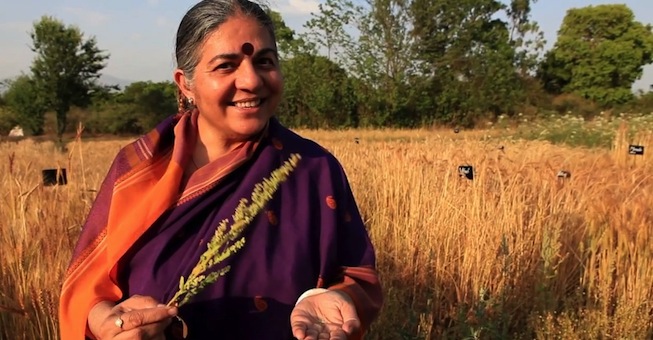An interview with Dr. Vandana Shiva
This week, Nonviolence Radio hears from Dr. Vandana Shiva; physicist, ecologist, fierce advocate of biodiversity and conservation, protector of farmers and women’s rights and prolific author. During the interview, Dr. Shiva speaks on a wide range of topics, from the dangers of philanthrocapitalism (the subject of her latest book from Synergetic Press, Philanthrocapitalism and the Erosion of Democracy: A Global Citizens’ Report on the Corporate Control of Technology, Health and Agriculture) to ecofeminism. With Stephanie and Michael, she expounds on what she sees as an insidious new form of colonialism, one which purports to offer us the benefits of technological ‘advances’ but in fact is slowly turning our bodies and minds away from – or even against – each other and the earth.
“How is philanthrocapitalism creating new colonies? And how are they defining primitiveness and barbarianism? And what is this civilizing mission? If in the first colonialism, religion was used as a civilizing mission, the new religion at this point is the tools of the philanthrocapitalists. And the level of violence being used to impose digital technologies is unbelievable…
What are the new colonies making? Education has become a new colony. Education was a public good. But look at the edge-tech firms and how they are exploding and how every kid is forced to sit in front of the screen. And I keep wondering, you know, because I work in agriculture, I work with gardens. We created Gardens of Hope in schools just to let the mind of the child open up, and they become their full human potential by becoming part of the Earth. I’m just thinking of the children who day-in and day-out, day-in and day-out, just sitting in front of the screen. We know the data showing the eyes are going crazy.”
Thankfully, Dr. Shiva does not shrink in response to these challenges, rather she recognizes the power of human beings to bring about change, the power we have to unite, despite our superficial differences, to avoid ‘the trap of new colonial divide and rule policies.’ Recognizing our shared humanity and our profound connection to Mother Earth is the ground for generating – together – common solutions to our problems.










